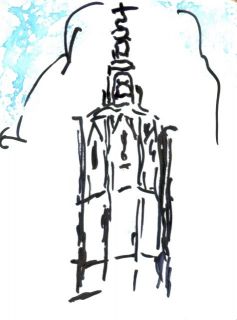
The bells of Southwark Cathedral being rededicated. ‘Since the 14th century, these bells have rung out to call the faithful to prayer.’ - Autor: The Diocese of Southwark

Charles Dickens spent most of the year after he wrote A Christmas Carol in Italy. Under contract to write a series of five Christmas books, and struggling to think of a follow-up to his popular story of Scrooge’s redemption, Dickens was woken one morning by the bells of the city of Genoa – “the clang and clash of all its steeples, pouring into his ears, again and again, in a tuneless, grating, discordant, jerking, hideous vibration” as John Forster, his first biographer described it. The book that this inspired was to become The Chimes – not one of his better known works maybe, but characteristically Dickens in its concern for the poor and our need for a moral awakening to their condition.
The bells serve as a moral metaphor throughout the novel. “High up in the steeple of an old church, far above the light and murmur of the town and far below the flying clouds that shadow it,” he wrote, “is the wild and dreary place at night: and high up in the steeple of an old church, dwelt the Chimes I tell of.”
The church he referred to was probably his local St Saviour Overie, now Southwark Cathedral, where he once joined the ringers in the church tower. And this week those same bells have been rededicated at a special service in the cathedral, now lovingly restored by John Taylor & Co, the Loughborough Bell Foundry. Since the 14th century, these bells have rung out to call the faithful to prayer and to mark special occasions: the weddings of royalty and commoners alike; the funerals of those who had dedicated themselves to the community.
Such as the former dean, my old friend the Very Rev Colin Slee, who died in 2010 and after whom one of the bells has now been named. He was a noisy advocate for social justice and an inclusive church, and it feels perfectly appropriate that he will continue to go on making a loud noise in the bell tower of the cathedral.
On Monday evening, the bells were baptised by the bishop, Christopher Chessun, ready to be rehung in the tower. Traditionally, bells wear a christening gown for the ceremony, treating them as if they were alive, like people. I find this rather touching – for there is something about the personification of bells, giving them names like Big Ben and Great Tom (at Christ Church, Oxford) that speaks to the way we have traditionally valued their presence in the soundscape of the city and the countryside, marking out time and drawing attention to significant events.
But these days the stockbroker who may have bought the Georgian vicarage next door to a church resents its bells waking him up on a Sunday morning. Now it’s the Shard and the great glass towers of the City that call more people to prayer. Dickens would be horrified.
Last month, in a sign of the times, the Whitechapel Bell Foundry announced it was closing. Guinness World Records cites it as the oldest manufacturing company in Britain, having begun during the reign of Queen Elizabeth I. This was the company that in 1752 made the famous Liberty Bell in Philadelphia.
For centuries, bells have patterned the public square with the sound of moral purpose. The Liberty Bell is marked with words from the book of Leviticus, 25:10: “Proclaim LIBERTY Throughout all the Land unto all the Inhabitants thereof.” Many Americans forget that this is a reference to the liberty of the biblical jubilee, in which property and wealth are redistributed and debts forgiven – something Jesus later called “good news to the poor and freedom to the captive”.
And for John Donne, in one of the most famous meditations ever written in English, it was the insistent tolling of a funeral bell that jabbed him into a recognition of our common humanity, that “no man is an island”. As he concluded: “therefore never send to know for whom the bell tolls; it tolls for thee.”
As many bells fall silent, so we lose another of those little routine prompts that seek to poke us into being a better version of ourselves.
 |
||
© The Guardian (2017) © Campaners de la Catedral de València (2024) campaners@hotmail.com Updating: 16-04-2024 |
||